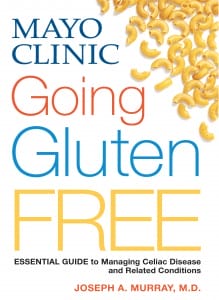His patients call him ‘Doc’. Approachable and plainspoken, gastroenterologist Joseph Murray is an expert at making sure his patients understand in lay terms exactly what celiac disease is and to treat it.
Allergic Living spoke with Dr. Murray about the book he and his colleagues published –Mayo Clinic Going Gluten-Free: The Essential Guide to Managing Celiac Disease and Other Related Conditions. It’s a compilation of the knowledge the Mayo experts have accumulated over the years, sort of “everything you always wanted to know about gluten but didn’t know to ask.”
In our interview, Dr. Murray covers everything from the need for more celiac disease screening to persistent symptoms, myths, and his take on the effects of gluten-free fad dieting.
Allergic Living: What made you write Going Gluten-Free, and who is it aimed at?
Several trends prompted us, including the dramatic increase in the number of celiac disease cases and the media’s interest in all things gluten. The popular press has sensationalized gluten and it has become hard to avoid discussions of it wherever you go.
Here’s what it’s not: a reference book meant to educate my colleagues, and it’s not just my book. Going Gluten Free represents a collection of wisdom, experience and science from across the spectrum, from dietitians and nutritionists, gastroenterologists, psychologists. [Mayo Clinic] editorial staff worked to make the publication accessible, authentic and readable because it represents real life with celiac disease from all perspectives: living with it, treating it and working in the field.
What do you think of doctors who counsel patients to eliminate gluten from their diet even when there is no indication it is a problem?
The physician in me can relate to the frustration that health practitioners and doctors feel when patients have symptoms that persist, so I can see why they would counsel people to try it. But as a scientist, I search for answers before making a call. I see a lot of patients who go off gluten, feel better for a few months and then their symptoms come back.
So several big issues concern me, including: Have these patients been tested for celiac disease? Maybe the problem isn’t with gluten. Maybe it’s an allergy to wheat or [an issue with] FODMAPs, small sugar-like molecules often found in fruits and some vegetables. The thing is, if they don’t get tested, then we’ll never know.
You mention in the book that some experts feel the entire population should be screened for celiac disease. What’s your position?
Right now, we are testing a lot more patients than we have in the past. If I see a patient with anemia, I say, ‘Be tested.’ I say the same for those who have diarrhea or for all members of patients who have already been diagnosed. But we still miss about 80 percent of people who have the condition and, frankly, we don’t know what the impact of that is.
Ultimately, to find every person with celiac disease, we need to screen everyone at risk. Does that mean we need to test everyone? I’m not sure – but we do need to test a lot more people than we already are.
You state that the characteristics of the disease have evolved. What do you mean by that?
Back when I studied celiac disease in medical school in the 1970s and 80s, patients were supposed to have these symptoms: diarrhea, bloating and gas, a low weight, vitamin deficiencies and anemia. Now, most patients don’t present that way anymore. They present in many diverse ways ranging from anemia to abdominal pain to chronic fatigue. (See also: Non-Classic Symptoms of Celiac on the Rise.)
What should people who have to eliminate gluten from their diet watch out for?
Be sure to eat healthy! Many gluten-free packed foods on the market are high in fat, sugar and salt, which taste good but aren’t good for you. Make sure there is enough fiber in your diet and that you’re getting enough vitamins, iron, copper and folic acid.
Unlike regular products such as breakfast cereals, gluten-free substitutes aren’t so fortified. Consult a nutritionist if you have questions. Ask your doctor. Join a local celiac support group.
In the book, you say that symptoms persist in up to 30 per cent of patients after they have been gluten-free for between six months to a year. Why?
In the rare case, it could be refractory celiac disease, where the small intestine doesn’t heal despite adherence to a gluten-free diet. Or it could be from something else that in not related to celiac disease such as colitis, irritable bowel syndrome or lactose intolerance.
But in most cases, it means there is still a low level of gluten contamination going on. Recent studies have shown that products that shouldn’t contain gluten do have it. And an interesting survey last year had one-third of 200 British respondents revealing that they deliberately eat gluten from time to time.
It’s human nature. I like to quote Oscar Wilde. “Lord,” he wrote, “I can resist anything except temptation.”
Have you ever been surprised by a product that contains gluten?
Yes! Labeling laws have made me realize that there are products I never imagined would have contained gluten, but somehow it sneaks in. Think of hard candies that have been dusted with flour to keep them from sticking to wrappers. And even if there is no evidence of gluten on an ingredient list, it still could be present.
Oat-based products are particularly problematic. While oats themselves don’t contain gluten, they may have become contaminated by wheat or barley grown in nearby fields.
Is there any recipe that cannot be made gluten-free?
Well, I tell my patients to avoid bread for at least a month after going gluten-free so that their memory of the taste of real bread fades. It’s hard to make gluten-free bread that mimics the taste of the real thing.
Is there anything not in the book that you would have liked to include?
A big finding came out last month [October] after the book was finished about the possibility of preventing celiac disease from developing in children who are at risk for it by altering their infant feeding patterns. The findings indicate that you can’t. So if you’re a mom with celiac disease, don’t feel bad that you can’t prevent it in your child.
What are some of the myths you’ve heard about the condition?
There are so many! Doctors used to ask patients ‘Are you Irish?’ because Ireland was thought to be a hotbed of celiac disease. But you don’t have to be Irish to have the condition.
On the patients’ side, I often hear, ‘I was born with celiac disease.’ No, you weren’t. You can only develop it after you’ve been exposed to gluten.
Do you have any special tips for readers to handle festive occasions such as Christmas or Easter?
These pose special challenges because of the food and the social context in which the meals will occur. If you can, host a festive dinner in your own home because then, you can control it. If you do go to someone else’s house, bring food that is safe and safely packaged in plastic, foil or containers so that it doesn’t get contaminated. Bring your own serving spoon and make sure that plates and cutlery at the party are clean.
If you’re traveling and going out to eat, suggest that you pick the restaurant because of your dietary needs. Go online and do your research. Nothing is better than to call beforehand and ask, ‘What can you do for me?’ If you’re flying, it’s always a good idea to bring your own food, such as gluten-free bars.
Is the gluten-free fad helpful or harmful to those must follow this diet for health reasons?
It’s both. The awareness it brings to manufacturers and food providers encourages them to make a good faith effort to provide options for people with celiac disease. At the same time, there is a danger that the diet is trivialized; it is possible people will assume you’re on it because it’s a fad and you’re just trying it out.
Still, it’s more positive than not because it has helped to expand awareness and regulations, especially when it comes to product labeling. The challenge comes when you’re eating out. Think of a waiter whom you have just informed of your condition asking, ‘Do you really need it or do you want it?’ For people with celiac disease, it’s not a choice!
Dr. Joseph Murray’s book, Mayo Clinic Going Gluten-Free: The Essential Guide to Managing Celiac Disease and Other Related Conditions, is published by Oxmoor House. To order your copy online, click here.







